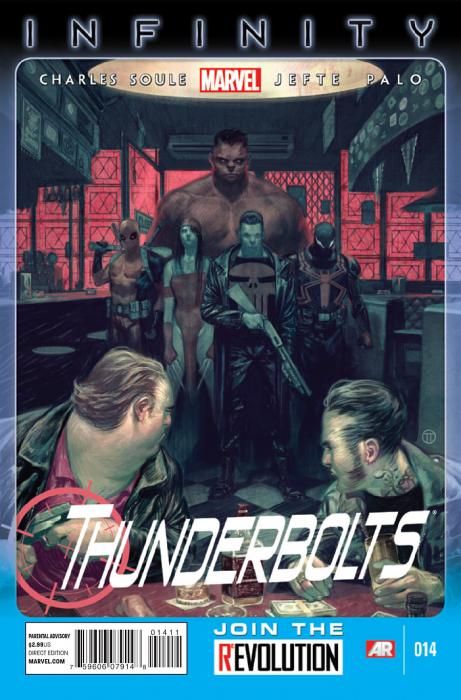"Thunderbolts" #14 by Charles Soule and Jefte Paolo is billed on the cover as being part of the "Infinity" event, but that claim is a huge stretch. It's skipable as an "Infinity" tie-in; the action doesn't cross over at all except in a "meanwhile in space" cameo. With that expectation out of the way, "Thunderbolts" #14 is still worth picking up for the first glimpse of new ongoing writer Charles Soule's vision for the team's mission.
Soule starts by showing the team taking down a farmyard cow that has been transformed into what looks like a six-legged green dragon. The scene has a zany, bouncy "Superfriends" tone, but with more griping and slaughter (which thankfully ground it enough to prevent it from being parody). It's fun, it includes a pun and it immediately tells readers that Soule is going for a more playful, less grim approach than Way's run.
Directly afterwards, Soule shows the team back at base camp, where he calls in the framing device that Way set up, with Red Hulk's promise to "take turns." It's a classic, effective way to set up an episodic plot, but unfortunately, the new winner of the Thunderbolts lottery is Punisher. The remaining plot in "Thunderbolts" #14 is not only more serious, but also blander and more conventional than the gamma-cow battle scene.
The details of a mob territorial monopoly and extortion racket aren't enough to make Punisher's wish very different from any other Punisher story. The man is nothing if not single-minded. Soule acknowledges this in Deadpool's response, which is the single funniest line in "Thunderbolts" #14.
Paolo's art is an uneven for these scenes, better with humor and action than with emotions and bodies. His linework is inconsistent with characters' facial proportions and bodies across panels. Background detail veers between full or sparse with no accompanying narrative reason. His abbreviated, blocky and exaggerated style veers into cartoony territory, which works fine for the gamma-cow scene but is ill-suited for the mob plot. Paolo's strengths are his flow of action and smooth transitions. His pacing in the talking-heads scenes are excellent, making up for his lack of subtlety with facial expressions.
Despite Soule's irony and Paolo's energy, there isn't enough substance to Punisher's mission. "Thunderbolts" has lacked compelling villains from the start. The problem isn't the scale of evil, because of course international terrorists and organized crime are worth fighting. The problem is that the villains have been difficult to identify with and two-dimensional. Soule tries to inject some personality by including a scene in which some hapless criminals rub the Paguros the wrong way during an "audition" to be part of their network, but the scene lacks both surprise and suspense.
On the other hand, over three issues, Soule has steadily given the Thunderbolts themselves more depth. All superhero teams that share living quarters fit together more or less like families, some more dysfunctional than others. When Thunderbolts share domestic space, Soule wisely uses that intimacy to deepen characterization. In addition to making Deadpool sillier and obnoxiously amusing again (instead of Way's more sullen and sarcastic take), Soule is adding something to Venom's portrayal. Out of the Thunderbolts, Flash's moral code seems the most conservative about violence, which is no advantage to him when he's swimming with the sharks.
The team-specific dynamics, like Venom's possible Odd Man Out status, feel like the real meat of "Thunderbolts" #14, and while the "Infinity" crossover may eventually add more interest to a typical mob bust, here's hoping that it doesn't slow down the 'Bolts getting to know each other.

